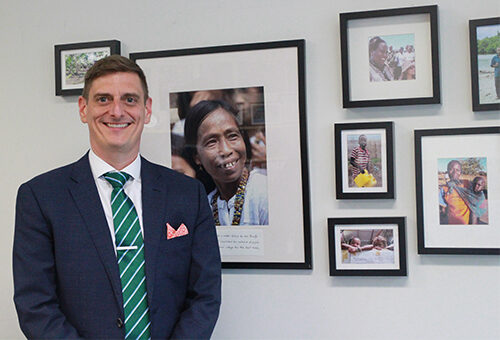ABM Archive Website
THIS WEBSITE CONTAINS ARCHIVE MATERIALS FOR HISTORICAL REFERENCE ONLY
For up-to-date information, including our latest appeals, news, and resources, please visit our current website.
ABM farewells “DevCom” member Benjamin Shepherd
March 12, 2019

ABM is most grateful for the dedication and valuable contribution which Benjamin Shepherd has made over the years of serving on our Development Committee. Upon his retirement from this role, he shared his thoughts about being a part of ABM:
It has been a tremendous honour to serve on ABM’s Development Committee “DevCom” for the last 7 and a half years. I work in the renewable energy sector and I have a background in food security in developing countries. I was appointed to ABM’s Development Committee on the recommendation of long-time champion of ABM, Christopher Roper, to bring these technical perspectives to the committee.
Over these 6 and a half years, the Community Development program has faced significant challenges, notably including substantial reductions in Australian Government Development Aid funding which has of course impacted ABM along with many other organisations. It is a testament to the foresight of the ABM trustees and the governance of the ABM Board that the majority of programs have been able to continue to be funded without substantial disruption to the communities that depend upon them.
Moreover, the ABM Community Development team can – should – be especially proud of the many and substantial achievements that have been made despite the pressure that such external forces inevitably place on the organisation. It has been a privilege to see partners such as Amity in China, ECARE in the Philippines and ADSE in Kenya move from receivers of funds towards becoming self-sustaining entities; to see the flourishing of cross-partner co-operation, including annual community development training run by ECARE in the Philippines for other ABM partners; and to see programs such as the Ethiopia children’s library out-grow ABM, and perhaps most importantly, to see some of ABM’s oldest and longest running partnerships in PNG and Melanesia continue to strengthen in capacity and their communities benefit directly from ABM’s continued support.
 |
| Benjamin Shepherd, and above, with Lina Magallanes, International Programs Manager. |
The commitment of the ABM executives and team extends above and beyond the central work of community development with ABM’s partners. This was perhaps no more evident than during the arduous process of the organisational re-accreditation of ABM by DFAT last year where DFAT observed how ABM’s development practice was recognised as “delivering above what might be expected from an organisation of ABM’s size”, commented positively upon “the strength and integration of ABM’s partnerships”.
It has likewise been a privilege to get to know the wonderful and deeply committed Community Development team members, and witness the care and compassion ABM has for its staff. There are too many names to mention individually except for Julianne Stewart whose retirement last year after 9 years as Program Director was a sad occasion for us all, except for the example it provides of how ABM nurtures staff to grow in their roles and develop both as professionals and members of the Anglican Communion.
ABM has more than 150 years of history of mission in PNG and Melanesia and coming up to 75 years in Asia. These deeply committed relationships stretch far beyond the life of any individual contribution but constitute an essential component of the life of the Anglican Communion. My time with this wonderful organisation has been short in the scheme of things but I am proud and delighted to have been part of DevCom and on this occasion of my retirement from the Committee, I urge all Australian Anglicans to commit to on-going support for ABM’s wonderful and always-important work of working for Love, Hope and Justice, and to see it continue not just in our own lifetimes but through future generations of Anglicans.
Benjamin Shepherd


